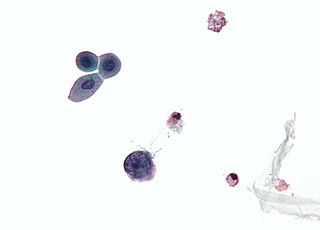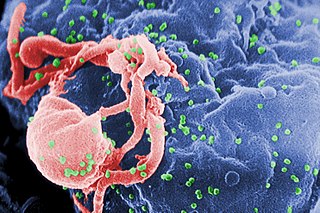Related Research Articles

Sjögren's disease (SjD) is a long-term autoimmune disease that primarily affects the body's exocrine glands, particularly the lacrimal and salivary glands. Common symptoms include dry mouth, dry eyes and often seriously affect other organ systems, such as the lungs, kidneys, and nervous system.

In immunology, autoimmunity is the system of immune responses of an organism against its own healthy cells, tissues and other normal body constituents. Any disease resulting from this type of immune response is termed an "autoimmune disease". Prominent examples include celiac disease, diabetes mellitus type 1, Henoch–Schönlein purpura, systemic lupus erythematosus, Sjögren syndrome, eosinophilic granulomatosis with polyangiitis, Hashimoto's thyroiditis, Graves' disease, idiopathic thrombocytopenic purpura, Addison's disease, rheumatoid arthritis, ankylosing spondylitis, polymyositis, dermatomyositis, and multiple sclerosis. Autoimmune diseases are very often treated with steroids.

Immunosuppression is a reduction of the activation or efficacy of the immune system. Some portions of the immune system itself have immunosuppressive effects on other parts of the immune system, and immunosuppression may occur as an adverse reaction to treatment of other conditions.
Immunotherapy or biological therapy is the treatment of disease by activating or suppressing the immune system. Immunotherapies designed to elicit or amplify an immune response are classified as activation immunotherapies, while immunotherapies that reduce or suppress are classified as suppression immunotherapies. Immunotherapy is under preliminary research for its potential to treat various forms of cancer.

Severe combined immunodeficiency (SCID), also known as Swiss-type agammaglobulinemia, is a rare genetic disorder characterized by the disturbed development of functional T cells and B cells caused by numerous genetic mutations that result in differing clinical presentations. SCID involves defective antibody response due to either direct involvement with B lymphocytes or through improper B lymphocyte activation due to non-functional T-helper cells. Consequently, both "arms" of the adaptive immune system are impaired due to a defect in one of several possible genes. SCID is the most severe form of primary immunodeficiencies, and there are now at least nine different known genes in which mutations lead to a form of SCID. It is also known as the bubble boy disease and bubble baby disease because its victims are extremely vulnerable to infectious diseases and some of them, such as David Vetter, have become famous for living in a sterile environment. SCID is the result of an immune system so highly compromised that it is considered almost absent.
Immunodeficiency, also known as immunocompromisation, is a state in which the immune system's ability to fight infectious diseases and cancer is compromised or entirely absent. Most cases are acquired ("secondary") due to extrinsic factors that affect the patient's immune system. Examples of these extrinsic factors include HIV infection and environmental factors, such as nutrition. Immunocompromisation may also be due to genetic diseases/flaws such as SCID.

Peter Charles Doherty is an Australian immunologist and Nobel laureate. He received the Albert Lasker Award for Basic Medical Research in 1995, the Nobel Prize in Physiology or Medicine jointly with Rolf M. Zinkernagel in 1996 and was named Australian of the Year in 1997. In the Australia Day Honours of 1997, he was named a Companion of the Order of Australia for his work with Zinkernagel. He is also a National Trust Australian Living Treasure. In 2009 as part of the Q150 celebrations, Doherty's immune system research was announced as one of the Q150 Icons of Queensland for its role as an iconic "innovation and invention".

Rolf Martin Zinkernagel AC is a professor of experimental immunology at the University of Zurich. Along with Peter C. Doherty, he shared the 1996 Nobel Prize in Physiology or Medicine for the discovery of how the immune system recognizes virus-infected cells.
Primary immunodeficiencies are disorders in which part of the body's immune system is missing or does not function normally. To be considered a primary immunodeficiency (PID), the immune deficiency must be inborn, not caused by secondary factors such as other disease, drug treatment, or environmental exposure to toxins. Most primary immunodeficiencies are genetic disorders; the majority are diagnosed in children under the age of one, although milder forms may not be recognized until adulthood. While there are over 430 recognized inborn errors of immunity (IEIs) as of 2019, the vast majority of which are PIDs, most are very rare. About 1 in 500 people in the United States are born with a primary immunodeficiency. Immune deficiencies can result in persistent or recurring infections, auto-inflammatory disorders, tumors, and disorders of various organs. There are currently limited treatments available for these conditions; most are specific to a particular type of PID. Research is currently evaluating the use of stem cell transplants (HSCT) and experimental gene therapies as avenues for treatment in limited subsets of PIDs.
Testicular Immunology is the study of the immune system within the testis. It includes an investigation of the effects of infection, inflammation and immune factors on testicular function. Two unique characteristics of testicular immunology are evident: (1) the testis is described as an immunologically privileged site, where suppression of immune responses occurs; and, (2) some factors which normally lead to inflammation are present at high levels in the testis, where they regulate the development of sperm instead of promoting inflammation.
A humanized mouse is a genetically modified mouse that has functioning human genes, cells, tissues and/or organs. Humanized mice are commonly used as small animal models in biological and medical research for human therapeutics.

La Jolla Institute for Immunology (LJI) is a non-profit research organization in La Jolla, a community of San Diego, California. The institute was founded in 1988. It is located in UC San Diego’s Research Park. The institute researches immunology and immune system diseases. The institute employs 220 M.D.s and Ph.D.s, including 23 faculty members and more than 450 employees. Dr. Erica Ollmann Saphire has served as its president and CEO since 2021.

An autoimmune disease is a condition that results from an anomalous response of the adaptive immune system, wherein it mistakenly targets and attacks healthy, functioning parts of the body as if they were foreign organisms. It is estimated that there are more than 80 recognized autoimmune diseases, with recent scientific evidence suggesting the existence of potentially more than 100 distinct conditions. Nearly any body part can be involved.
Short Course Immune Induction Therapy or SCIIT, is a therapeutic strategy employing rapid, specific, short term-modulation of the immune system using a therapeutic agent to induce T-cell non-responsiveness, also known as operational tolerance. As an alternative strategy to immunosuppression and antigen-specific tolerance inducing therapies, the primary goal of SCIIT is to re-establish or induce peripheral immune tolerance in the context of autoimmune disease and transplant rejection through the use of biological agents. In recent years, SCIIT has received increasing attention in clinical and research settings as an alternative to immunosuppressive drugs currently used in the clinic, drugs which put the patients at risk of developing infection, cancer, and cardiovascular disease.
Immunoevasins are proteins expressed by some viruses that enable the virus to evade immune recognition by interfering with MHC I complexes in the infected cell, therefore blocking the recognition of viral protein fragments by CD8+ cytotoxic T lymphocytes. Less frequently, MHC II antigen presentation and induced-self molecules may also be targeted. Some viral immunoevasins block peptide entry into the endoplasmic reticulum (ER) by targeting the TAP transporters. Immunoevasins are particularly abundant in viruses that are capable of establishing long-term infections of the host, such as herpesviruses.

HIV/AIDS research includes all medical research that attempts to prevent, treat, or cure HIV/AIDS, as well as fundamental research about the nature of HIV as an infectious agent and AIDS as the disease caused by HIV.

Akiko Iwasaki is a Sterling Professor of Immunobiology and Molecular, Cellular and Developmental Biology at Yale University. She is also a principal investigator at the Howard Hughes Medical Institute. Her research interests include innate immunity, autophagy, inflammasomes, sexually transmitted infections, herpes simplex virus, human papillomavirus, respiratory virus infections, influenza infection, T cell immunity, commensal bacteria, COVID-19, and long COVID.
Immunoglobulin therapy is the use of a mixture of antibodies to treat several health conditions. These conditions include primary immunodeficiency, immune thrombocytopenic purpura, chronic inflammatory demyelinating polyneuropathy, Kawasaki disease, certain cases of HIV/AIDS and measles, Guillain–Barré syndrome, and certain other infections when a more specific immunoglobulin is not available. Depending on the formulation it can be given by injection into muscle, a vein, or under the skin. The effects last a few weeks.

Robyn S. Klein is an American neuroimmunologist as well as the Vice Provost and Associate Dean for Graduate Education at Washington University in St. Louis. Klein is also a professor in the Departments of Medicine, Anatomy & Neurobiology, and Pathology & Immunology. Her research explores the pathogenesis of neuroinflammation in the central nervous system by probing how immune signalling molecules regulate blood brain barrier permeability. Klein is also a fervent advocate for gender equity in STEM, publishing mechanisms to improve gender equity in speakers at conferences, participating nationally on gender equity discussion panels, and through service as the president of the Academic Women’s Network at the Washington University School of Medicine.

Laura K. Mackay is an Australian immunologist and Professor of Immunology at the University of Melbourne. Mackay is the Theme Leader in Immunology and Laboratory Head at the Peter Doherty Institute for Infection and Immunity. In 2022, she was the youngest Fellow elected to the Australian Academy of Health and Medical Sciences.
References
- ↑ "Mariapia Degli-Esposti". www.science.org.au. Retrieved 2024-07-26.
- ↑ "Tackling viral infection to protect transplant patients". Monash Lens. 2019-10-23. Retrieved 2024-07-26.
- ↑ "Director's Seminar Series - Professor Mariapia Degli-Esposti, Monash University". The John Curtin School of Medical Research. Retrieved 2024-07-26.
- ↑ Monash Biomedicine Discovery Institute (2023-09-25). Professor Mariapia Degli-Esposti - 2023 Academy Fellow . Retrieved 2024-07-26– via YouTube.
- ↑ Australian Museum (2019-07-30). Prof Mariapia Degli Esposti and Team, WINNER 2019 UNSW Eureka Prize for Scientific Research . Retrieved 2024-07-26– via YouTube.
- ↑ "Medical 'breakthrough' may spell end of potentially toxic drugs in transplant recipients". ABC News. 2019-01-17. Retrieved 2024-07-26.
- ↑ "Study identifies a previously unknown role of 'natural killer' immune cells". News-Medical. 2023-02-10. Retrieved 2024-07-26.
- ↑ Bowman, Rhiannon (2023-02-14). "Immune cells discovery could treat autoimmune diseases like Sjogren's Syndrome". Insight. Retrieved 2024-07-26.
- ↑ "Coronavirus, we speak to world-renowned researcher on the immune system". SBS Language. Retrieved 2024-07-26.
- ↑ "Coronavirus? What the expert says". SBS Language. Retrieved 2024-07-26.
- ↑ ""Prima ci vaccineremo tutti, prima torneremo alla normalità"". SBS Language (in Italian). Retrieved 2024-07-26.
- ↑ Vincent, Caroline (2023-05-25). "Professor Mariapia Degli-Esposti receives prestigious honour". Lions Eye Institute. Retrieved 2024-07-26.